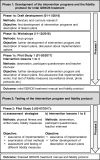Promotion of physical activity-related health competence in physical education: study protocol for the GEKOS cluster randomized controlled trial
- PMID: 30975111
- PMCID: PMC6458821
- DOI: 10.1186/s12889-019-6686-4
Promotion of physical activity-related health competence in physical education: study protocol for the GEKOS cluster randomized controlled trial
Abstract
Background: One central goal of physical education in many countries is to empower students to be physically active throughout their lifespan. Physical activity-related health competence (PAHCO) encompasses physical, cognitive, and motivational elements associated with the individuals' ability to be physically active in a health-enhancing way. To date, there is a lack of empirical evidence concerning effective programs and methods to promote PAHCO in physical education. The purpose of this study is to examine to what extent a health and physical fitness-related program that includes learning tasks integrating theoretical and practical elements promotes students' PAHCO in physical education.
Design/methods: This study is a cluster randomized controlled trial that compares two physical education intervention programs on health and physical fitness (IG-run, IG-game play) with regular physical education lessons (CG-run, CG-game play) in secondary schools in Germany. Forty-eight physical education classes (ninth grade) were recruited and randomly allocated to the four study groups. The intervention programs include six physical education lessons on health and physical fitness and only differ in the type of physical activity that is executed (running and jumping vs. small-sided games). The students' PAHCO is examined both pre- and post-intervention and after 8-12 weeks of follow-up. We also determine various process variables during the intervention period to analyze the intervention fidelity.
Discussion: The results of this study provide evidence on whether a combination of theoretical and practical elements in physical education can enhance students' PAHCO. Beyond that, our process analyses will allow differentiated insights into the mechanism of how the intervention programs work.
Trial registration: German Clinical Trials Register (DRKS), DRKS-ID: DRKS00016349 . Retrospectively registered on 10 January 2019.
Keywords: Health literacy; Health-related fitness knowledge; Intervention fidelity; Learning task; Physical education; Physical literacy; RCT.
Conflict of interest statement
Ethics approval and consent to participate
The Ethics Committee for Psychological Research at the University of Tuebingen reviewed GEKOS and offered its favorable ethical opinion (Revision_1_ 2017_0825_78). We obtained informed consent for this study on five levels. First, the Regional Council of Tuebingen and the Ministry of Education and Cultural Affairs in the federal state of Baden-Wuerttemberg approved the implementation of the study. Second, during the recruitment process, we sent the study information and the ethical and political approval to all schools in Baden-Wuerttemberg. Third, the school principals agreed to conduct the study at their schools. Fourth, the participating teachers provided informed consent at the teacher training session (intervention group) or sent it by mail to the main researchers (control group). Fifth, the students and their parents gave their consent to complete the tests (T1–T3) and process analysis during the intervention. Consent to take part in the program is not required since it falls within the usual school curriculum. We code all study materials with student identification numbers to ensure participant anonymity. Therefore, these materials do not include identifying information. A single coding sheet that connects the identification number to the real name of the student exists; we store this sheet separately from the study material and destroy it after completion of the data collection (follow-up). We transmit and maintain all surveyed data in password-protected computer files. Only project leader and main researchers have access to the final trial set.
Consent for publication
Not applicable.
Competing interests
The authors declare that they have no competing interests.
Publisher’s Note
Springer Nature remains neutral with regard to jurisdictional claims in published maps and institutional affiliations.
Figures




References
-
- Society of Health and Physical Educators . National standards & grade-level outcomes for K-12 physical education. Champaign, IL: Human Kinetics; 2014.
-
- Tremblay M, LLoyd M. Physical literacy measurement - the missing piece. Physic Health Educ. 2010;76(1):26–30.
-
- Demetriou Yolanda, Höner Oliver. Physical activity interventions in the school setting: A systematic review. Psychology of Sport and Exercise. 2012;13(2):186–196. doi: 10.1016/j.psychsport.2011.11.006. - DOI
Publication types
MeSH terms
Grants and funding
LinkOut - more resources
Full Text Sources
Medical
Molecular Biology Databases

